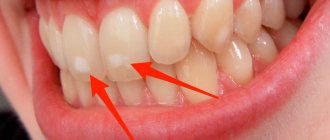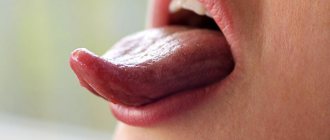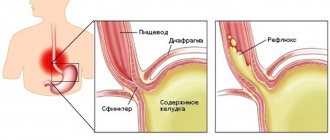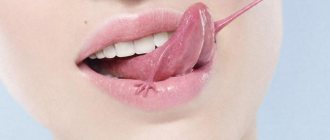Some people keep a glass of water on their bedside table because they wake up at night with a feeling of dry mouth and often accompanying thirst. Such phenomena may be normal and appear, for example, due to eating salty foods in the evening. Sometimes dry mouth occurs due to more serious causes, such as diabetes, Sjögren's disease, or taking certain medications. In some cases, other types of disorders can also lead to the appearance of this symptom, for example, breathing disorders, including nasal breathing, during sleep.
Are you worried about night or morning dry mouth? It may be a sign of sleep disturbances. Contact our Center and we will help you effectively! Sign up by phone.
Why does my mouth get dry?
If sometimes your mouth gets dry in the morning, it’s not a big deal. But constantly waking up at night because your throat is dry and you need to drink causes anxiety. There are several reasons why the mucous membranes of the mouth are not wet, but dry, in the morning.
Air humidity
Since the human body consists of 90% water, dry indoor air leads to drying of the skin and mucous membranes. When the humidity level drops to 10%, even a completely healthy person will feel unwell.
He will have a feeling of dryness in the nasopharynx and throat. There will be pain in the eyes and redness. Dry air is especially dangerous for newborns. It will bring diseases to the child in the form of dysbacteriosis, allergies, and chronic diseases.
Dehydration, or dehydration
The body needs water in order to function normally. When the level of water balance decreases, this is fraught with death. If you drink little water and rely on coffee and alcohol, dehydration will quickly occur.
The cause of dehydration is diarrhea and vomiting that occurs due to poisoning and poor nutrition. Dehydration also occurs due to overheating of the body. Lying in the sun for a long time leads to disruption of the water balance in the body. If it is not restored, it leads to serious complications.
Nervous tension, anxiety
During times of stress and excitement, the mouth becomes dry. The reasons for this condition include the fact that there is active sweating. And saliva begins to be poorly produced. When a dream causes fear and tension, they wake up because the mucous membranes have dried out.
Poor nutrition
Sweet tooth lovers often experience dry mouth. When you get carried away with eating spicy, salty foods, you wake up at night and find that your tongue is dry and difficult to swallow. After dinner with flour, sweet or salted fish, sausage, mayonnaise, much more water is required. After all, the body spends moisture to remove unnecessary substances. If you don't replenish your water supply at night, your throat will be dry in the morning.
Smoking and alcohol
The next morning after a rich feast, they get up with a dry mouth. You constantly want to drink because alcohol serves as a source of rapid urine formation. Without replenishing moisture, the tongue and mucous membranes of the oral cavity begin to dry. Smokers constantly feel a sore and dry throat.
Even those who quit a bad habit experience an unpleasant symptom. You can help with cough lozenges and steam inhalations.
Taking medications
During periods of treatment with antibiotics and antihistamines, dry mouth occurs in the morning. The same reaction appears to the use of medications against arterial hypertension and depressive states.
In pregnant women
During the period of bearing a child, a woman’s body is reconstructed. Hormonal imbalances may occur. Dry mucous membranes after sleep become a symptom of gestational diabetes. A metallic taste in the mouth is also a sign of the development of the disease.
Dry mouth in pregnant women as a result of increased sweating, increased work of the genitourinary system, and increased stress. An unpleasant symptom occurs due to a lack or excess of potassium or magnesium in the body. Only a doctor can identify the cause of the condition.
The main causes of dry mouth at night and in the morning
In the elderly
In older people, hormonal changes in the body lead to unpleasant sensations. Among them is that the tongue and throat dry out in the morning or at night. The sensation usually occurs due to taking anti-hypertensive pills.
The salivary glands begin to work worse with age, so diseases of the digestive tract, kidney dysfunction, and liver cause the mucous membranes of not only the mouth, but also the nose and eyes to dry out. In addition, older people are often nervous and depressed, which makes xerostomia chronic.
Diagnostic measures
If your mouth is dry at night and you are very thirsty, you should not wait for the symptom to disappear. Contact your general practitioner and undergo an examination, which will include blood tests (general, hormone tests). Diagnostic procedures may be prescribed to analyze the functioning of organs: ECG, CT, radiography, MRI.
After receiving the examination results, the therapist refers the patient to specialized specialists: endocrinologist, ENT specialist, surgeon, gynecologist, infectious disease specialist, dentist, gastroenterologist. The doctor will conduct a detailed diagnosis and prescribe treatment.
What diseases cause dryness
Most often, dry mouth at night occurs due to a lack of saliva secretion. Depending on the accompanying symptoms, the presence of a particular disease is determined. At high body temperature, intoxication of the body occurs. Flu, colds, and rhinitis are accompanied by a lack of nasal breathing. The patient breathes through his mouth. Hence the severe dryness.
Acute pancreatitis is determined by the appearance of nausea, vomiting, diarrhea, and pain in the left side of the abdomen. At the same time, the mouth dries out and bitterness appears. Diseases of the digestive tract exhibit similar symptoms. Added to these are the appearance of a yellowish or whitish coating on the tongue and a bitter taste.
The causes of dry mouth lie in the development of diseases associated with:
- hormonal imbalances – diabetes mellitus, thyrotoxicosis;
- neoplasms in the oral cavity;
- iron deficiency in the blood;
- lack of vitamin A;
- damage to the salivary glands and nerve endings in them.
If external factors can be eliminated, then drying of the mucous membranes due to pathological changes in organs and systems can only be cured with medication. Treatment is prescribed by a doctor based on diagnostic data.
Treatment with home remedies
Xerostomia, which is not a symptom of a serious disease, is treated with traditional methods.
The following recipes moisturize the mucous membrane, increase saliva production, and help with inflammation:
- Dissolve aloe juice in water (40-50 ml per glass). Rinse your mouth 3 times a day.
- Chew 1 tsp after eating. pharmaceutical dill. Repeat for 2-3 weeks. Due to the high content of flavonoids, the plant stimulates salivation.
- Before meals, take 15 drops of wormwood tincture. Repeat every day for three weeks. Bitter herb irritates the receptors, increases the sensitivity of the hunger center, which causes an increase in the amount of saliva.
- Prepare rosemary infusion. Pour 300 ml of boiling water over 15-20 leaves of the plant. Leave for 1-1.5 hours. Rinse your mouth daily before eating.
- Grape seed oil has a gentle effect on the oral mucosa, moisturizes and heals small cracks. Apply before bed to the tongue, inner surface of the cheeks, lips. The oil removes tightness, envelops affected, injured tissues, and facilitates swallowing.
- Refreshes, moisturizes and accelerates the healing of minor damage to the mucous membrane with a herbal collection of calendula, peppermint, chamomile, and plantain. You need to take 1 teaspoon of each herb and mix. Pour the mixture with hot water, about 90º C. Leave for 3-4 hours. Rinse your mouth with the broth every time after eating.
Ginger increases saliva production. It is useful to drink ginger infusion, lemon-ginger tea, or simply add the root to food.
Why is dry mouth dangerous?
Dry cough at night
If you do not pay attention and do not identify why the mucous membranes of the mouth dry out, this can lead to:
- digestive system disorders;
- carious lesions of teeth;
- dysbacteriosis and fungal infections;
- inflammation of the gums;
- difficulty breathing and swallowing.
The combination of dry mouth with other symptoms requires a visit to the doctor
Only a timely visit to a doctor, dentist or therapist will avoid serious consequences.
Which doctor should I contact?
Since xerostomia is not a disease, but a symptom of one or more disorders, the patient can go to a general practitioner (family doctor or therapist) or dentist with a complaint.
You should not postpone a visit to the doctor if other symptoms appear at the same time:
- complicated caries (tooth pain is severe);
- rashes, redness on the face and body;
- dehydrated, tight skin;
- irritated, dry eyes;
- pain in muscles, joints.
To clarify the cause, the doctor may additionally refer the patient to a gastroenterologist, gynecologist, rheumatologist or endocrinologist.
How to prevent
The water-salt balance is restored by drinking plenty of fluids. When you are thirsty, you should drink up to 30-40 ml of liquid per kilogram of weight. Stimulation of saliva secretion is carried out by rinsing the mouth before bed with water and adding drops of lemon juice. Chewing gum and lozenges with citric acid increase salivation.
It is useful to take an infusion of coltsfoot or echinacea. It will prevent the development of colds, rhinitis, and strengthen the immune system during flu and colds. You can sleep peacefully at night, breathing freely through your nose. A sufficient amount of saliva will be released in the mouth during sleep to moisturize the mucous membrane if:
- stop smoking and drinking alcohol;
- eat properly without a lot of sweets and salty foods;
- brush your teeth with pastes containing fluoride, rinse your mouth with special solutions and balms in the morning;
- maintain optimal humidity in the room at 50-60%;
- control the temperature in the room by ventilating it before going to bed;
- engage in physical activity, observing the drinking regime.
Prevention of inflammation in the mouth, gums and teeth is successful with regular visits to the dentist.
Drying of the membranes of the oral cavity is felt especially after a night's rest. This sign cannot be ignored. Only an examination by a specialist and a thorough diagnosis will determine the cause of persistent dry mouth.
Preventive measures
This is how much water you need to drink every day (1.5 liters)
How to avoid dry mouth at night? There will be no discomfort after sleep due to lack of saliva if:
- Drink more clean water. It is dehydration that most often causes morning dry mouth, so you need to drink at least 1.5 liters of water per day, excluding tea, juices or compotes.
- Increase the amount of fresh fruits and vegetables in your diet. They are 70-90% water, so they are great for combating dryness, and acidic fruits also activate additional saliva production.
- Avoid dry foods: crackers, cookies, crackers, chips, etc. Due to their structure, when they enter the stomach, they practically pump water out of the body, causing the mucous membrane to dry out.
- Monitor the level of humidity and air temperature in the bedroom: ventilate the room more often and leave the window open at night in the warm season, regularly carry out wet cleaning, etc.
In addition, it is better not to drink coffee and drinks with a diuretic effect in the evening, because of which the body will actively lose fluid, have dinner no later than 2-3 hours before bedtime, and rinse your mouth before going to bed water with a few drops of lemon juice.
Air leakage from under the nasal mask
Not a single mask fits completely tightly on the face; it has a special valve for exhalation, and air periodically leaks from under the contour of the mask adjacent to the face. Even if you use a special option to control the degree of contact of the silicone contour to the skin and the equipment shows that there is no problem, there is still a risk of minor leakage. In this case, small air losses will not affect the quality of therapy. Modern CPAP machines have a leak compensation function; if there is a loss of pressure, the device will increase the force of the air flow and the airways will remain open. But the more intense the air flow, the greater the negative impact on the mucous membranes and the more dry the lips, tongue and throat will be.
Consequences
Dryness itself is not dangerous if it occurs infrequently and does not cause discomfort. But an increase in the symptom can disrupt sleep and prevent sleep at night, cause insomnia and, as a result, chronic fatigue and irritability. Thinned mucous membranes can become damaged, bleed, become covered with ulcers, and interfere with normal eating and drinking.
Constant dryness will worsen the quality of life and affect all areas of it: career, personal life, communication with loved ones. If the disease causing the symptom is not treated, it will become chronic or cause serious consequences.
Breathing through the mouth
Nasal breathing is considered to be as correct and natural as possible. But there are a number of reasons why we can breathe through our mouth. For example, poor nasal passages due to a deviated septum, polyps or allergic rhinitis. Even if you just hold your mouth open for a few minutes or talk long enough, you can feel like everything is dry inside. If we add to this the effect of constant air flow, it becomes clear why the mucous membranes dry out so much.









